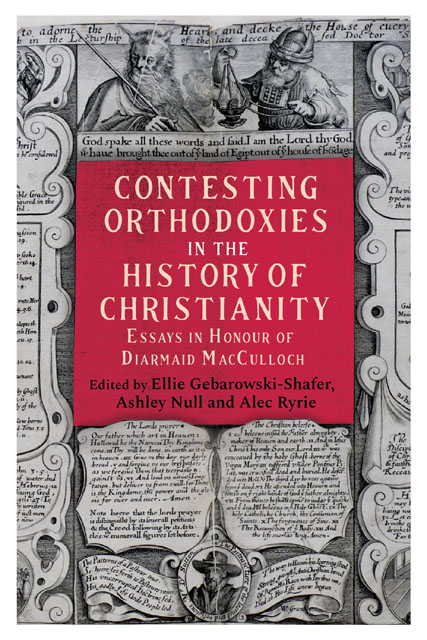Book contents
- Frontmatter
- Contents
- List of Illustrations
- List of Contributors
- List of Abbreviations
- Introduction
- 1 ‘Jewish Christianity’ in Antiquity: Meaningless Category or Heuristic Irritant?
- 2 ‘Sola Fide’: the Wrong Slogan?
- 3 Both Cromwellian and Augustinian: the Influence of Thomas Cromwell on Reform within the Early Modern English Austin Friars
- 4 Lex, Rex and Sex: The Bigamy of Philipp of Hesse and the Lutheran Recourse to Natural Law
- 5 The Authority of Scripture in Reformation Anglicanism: Then and Now
- 6 Orthodoxy and Heresy in the Post-Reformation
- 7 Profanity and Piety in the Church Porch: the Place of Transgression in Early Modern England
- 8 Writing on the Walls: Word and Image in the Post-Reformation English Church
- 9 The Myth of the Church of England
- 10 Mysticism, Orthodoxy and Reformed Identity before the English Revolution: the Case of John Everard
- 11 Sacrilege and the Sacred in England’s Second Reformation, 1640–1660
- 12 ‘I had not the patience to be quiet’: Arthur Bury and The Naked Gospel
- 13 ‘A soul-corrupting indifferentism’: the Intellectual Development of Benjamin Henry Latrobe
- 14 Newman, Dogma and Freedom in the Church
- 15 ‘Tommy, ’ow’s yer soul?’ Reconsidering Religion and the British Soldier
- 16 The King James Vulgate
- 17 The Myth of the Anglican Communion?
- Select bibliography of Diarmaid MacCulloch’s scholarly publications
- Bibliography
- Index
- Tabula Gratulatoria
- Studies in Modern British Religious History
12 - ‘I had not the patience to be quiet’: Arthur Bury and The Naked Gospel
Published online by Cambridge University Press: 09 January 2024
- Frontmatter
- Contents
- List of Illustrations
- List of Contributors
- List of Abbreviations
- Introduction
- 1 ‘Jewish Christianity’ in Antiquity: Meaningless Category or Heuristic Irritant?
- 2 ‘Sola Fide’: the Wrong Slogan?
- 3 Both Cromwellian and Augustinian: the Influence of Thomas Cromwell on Reform within the Early Modern English Austin Friars
- 4 Lex, Rex and Sex: The Bigamy of Philipp of Hesse and the Lutheran Recourse to Natural Law
- 5 The Authority of Scripture in Reformation Anglicanism: Then and Now
- 6 Orthodoxy and Heresy in the Post-Reformation
- 7 Profanity and Piety in the Church Porch: the Place of Transgression in Early Modern England
- 8 Writing on the Walls: Word and Image in the Post-Reformation English Church
- 9 The Myth of the Church of England
- 10 Mysticism, Orthodoxy and Reformed Identity before the English Revolution: the Case of John Everard
- 11 Sacrilege and the Sacred in England’s Second Reformation, 1640–1660
- 12 ‘I had not the patience to be quiet’: Arthur Bury and The Naked Gospel
- 13 ‘A soul-corrupting indifferentism’: the Intellectual Development of Benjamin Henry Latrobe
- 14 Newman, Dogma and Freedom in the Church
- 15 ‘Tommy, ’ow’s yer soul?’ Reconsidering Religion and the British Soldier
- 16 The King James Vulgate
- 17 The Myth of the Anglican Communion?
- Select bibliography of Diarmaid MacCulloch’s scholarly publications
- Bibliography
- Index
- Tabula Gratulatoria
- Studies in Modern British Religious History
Summary
Orthodoxies – their formation, defence and criticism – cannot be understood aside from their social and institutional contexts. This study of a pair of theological quarrels in late seventeenth-century Oxford details the career of the combative Arthur Bury in the context of Exeter College, Oxford, the community which incubated him and was eventually blown apart by the controversies he generated. In The Naked Gospel (1690), Bury made waves by calling for a return to a simpler Christian message, one that aligned with first-century values of poverty and humility, finding salvation through faith and works and exploring historical questions of Christ’s divinity. Bury was accused of heterodoxy and his book was burned by order of the university’s Convocation, but he proceeded to defend his views and to challenge his readers to think more deeply about the nature of Christ and the essence of Christianity. Although he paid a personal price for it, his intervention helped to break open Oxford’s consensus on orthodoxy, not least because it was itself partly a product of that consensus.
On 19 August 1690 an unusual but by no means unique event took place at Oxford University. Following a decree issued by the university’s Convocation, a treatise was publicly burnt for challenging religious orthodoxy. Seven years earlier, the same action had been taken with regard to the works of, among others, John Milton and Thomas Hobbes, for being perceived threats to the state and church. What gave added significance and frisson to the 1690 episode, however, was not only that The Naked Gospel was written by one of the university’s own – Arthur Bury, rector of Exeter College – but that the author was already embroiled in a dispute that had the potential to damage his college both academically and financially. Over the next few years, a heady combination of institutional politics and theological debate came to define Bury’s rectorship, colouring perceptions, reactions and loyalties both within and beyond the university. It also cemented his reputation as one of the most controversial and unorthodox of college heads.
The signs that this might be his legacy were apparent from early on in his career. Elected rector on 27 May 1666 at the prompting of Charles II in support of his chaplain, the Devon clergyman was not at the time a fellow of the college; although he had been one from 1643 until 1648 when he and others were deprived by parliamentary visitors ‘for their high contempt of the authority of parliament’.
- Type
- Chapter
- Information
- Contesting Orthodoxies in the History of ChristianityEssays in Honour of Diarmaid MacCulloch, pp. 208 - 218Publisher: Boydell & BrewerPrint publication year: 2021



